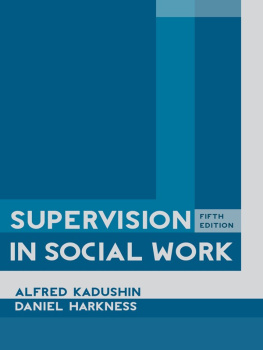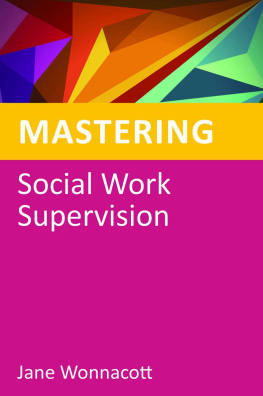SUPERVISION IN SOCIAL WORK
SUPERVISION IN SOCIAL WORK
FIFTH EDITION
ALFRED KADUSHIN
DANIEL HARKNESS
COLUMBIA UNIVERSITY PRESS
New York
Columbia University Press
Publishers Since 1893
New York Chichester, West Sussex
cup.columbia.edu
Copyright 2014 Columbia University Press
All rights reserved
EISBN: 978-0-231-52539-8
Library of Congress Cataloging-in-Publication Data
Kadushin, Alfred.
Supervision in social work / Alfred Kadushin, Daniel Harkness. Fifth edition.
pages cm
Includes bibliographical references and index.
ISBN 978-0-231-15176-4 (cloth : alk. paper) ISBN 978-0-231-52539-8 (electronic)
1. Social workersSupervision of. 2. Social workersSupervision ofUnited States. I. Harkness, Daniel. II. Title.
HV40.54.K33 2014
361.320683dc23
2013025568
COVER DESIGN: Jordan Wannemacher
References to websites (URLs) were accurate at the time of writing. Neither the authors nor Columbia University Press are responsible for URLs that may have expired or changed since the manuscript was prepared.
A Columbia University Press E-book.
CUP would be pleased to hear about your reading experience with this e-book at .
 CONTENTS
CONTENTSThe first edition of this book was published in 1976. A second edition was published in 1985, a third edition was published in 1992, and a fourth edition was published in 2002. A fifth edition at this time seems necessary, given the continued concern with supervision and the sizable number of books and articles related to social work supervision published since 2002. Some older concerns have become archaic, and some new concerns have become increasingly visible.
This book provides an overview of the state of the art of social work supervision. It is addressed to supervisors and those preparing to do supervision, whatever their formal educational background. It is also useful to social work supervisees, students, and workers in enabling them to make more productive use of supervision.
The book is designed to help the reader understand the place of supervision in the social agency, the functions it performs, the process of supervision, and the problems with which it is currently concerned. Although no book can directly further the development of skills, it provides the knowledge base that is a necessary prerequisite to learning how to supervise. The book frees the course instructor from the burden of presenting the general background of supervision so that more time can be devoted to consideration of clinical material and controversial points of view.
Developments in health and social welfare policy and practice during the past decade have intensified concerns about the preparation and size of the workforce and, given the key role that supervisors play in workforce training and retention, the diminishing availability of social work supervision. Against the backdrop of a fragile and stagnant economy, with political gridlock and widespread unemployment, our nation is divided about the appropriate size, scope, and sector of health and human services. The current situation is characterized by reductions in staff and retrenchment in programming, as agencies and institutions strive to get more from their workers with an uncertain future and fewer dollars to spend.
One possible, if difficult, solution is to increase the productivity of each worker. Increasing productivity requires greater managerial efficiency and more imaginative agency management. With the constriction of resources, practice has become more time limited and results oriented. This has intensified requirements for accountability and the need to justify the legitimacy of the agency through the demonstration of efficiency and effectiveness.
Organizational survival may hinge on the ability of administrative supervision to fine-tune agency performance, increase efficiency, and deploy limited staff more effectively. Supervisory personnel are the crucial element in dealing with worker efficiency and productivity as they were in meeting the earlier demands for increased agency accountability.
More limited resources and the demands associated with taxpayer revolts have made issues of accountability a matter of much greater concern than ever before. Because agency accountability starts with the supervisors review and evaluation of the work of the direct service staff, such issues intensify the visibility and importance of supervision.
The domination of managed care approaches to health care and the new public management in human services have intensified concerns with service efficiency and demands for accountability. The changing demographics of the client population and staff have increased the need for attention to the problems of diversity in supervision. The privatization of health and human services and government support for faith-based programs are often in conflict with traditional values of social work education and practice.
The increasing dependence of agencies on governmental funding, third-party payments, and legislative mandates have resulted in the increasing external regulation of agencies. The need for documentation of agency activities through periodic reports further increases the need for administrative supervision to ensure that such information is available. Compliance with external regulatory requirements of funding sources such as Medicaid, Medicare, and Title XX puts a premium on the need for supervisory personnel.
Regulatory developments during the past decade have once again increased the importance and significance of social work supervision. Legislation enacted by 2012 in the District of Columbia, the U.S. Territories, and all 50 states often requires that certified, licensed, or registered workers have formal access to supervision. This has particular relevance for the provision of health care, as third-party reimbursements by managed care organizations and insurers are typically limited to those social workers practicing at the highest level of licensurean achievement that typically requires an intensive and extended period of supervision. Where exceptions exist, social workers are often required to receive formal supervision as a third-party condition for payment.
Reduction in services and resources available to the social worker has resulted in a greater need to prioritize work and to prioritize decisions regarding the allocation of scarce supplies. Now more than ever before the worker is faced with the necessity of making difficult decisions regarding what gets done, what is ignored, who is provided service, and who is denied service. Many triage decisions now require, if not the help, at least the shared responsibility of a representative of management. Such situations increase the need for supervisory personnel.


 CONTENTS
CONTENTS







